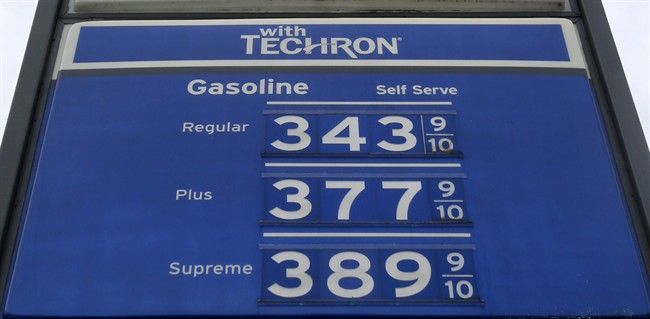After a dramatic increase, average Montreal gas prices had climbed a peak that had virtually never been seen before. Drivers, businesspeople, and consumers alike felt trapped, frustrated by the seemingly inexplicable spike in what they paid at the pump.

It was August 2006. Gas prices had reached $1.18 / litre.
Less than seven years later, these kinds of prices may seem to many Montrealers like the good old days. Indeed, since the beginning of 2013, average prices have rarely dipped below $1.30 / litre.
On Wednesday, they stood at $1.39 / litre, according to the website GasBuddy.com.
Except for some relatively brief interludes – the aftermath of the 2008 financial crisis being a striking example – gas prices have been trending upwards for years. According to data compiled by the Regie de l’energie du Quebec, the first monthly average to top the psychological barrier of one dollar per litre in Montreal was August 2005. It has seldom gone below it in the subsequent years.
In an interview with Global News, Sonia Marcotte, chief operating officer of the Association quebecoise des independents du petrole, explained that there are three main factors influencing what customers pay at the pump: crude oil prices, refinery prices, and additional local factors.
Ms. Marcotte said that, contrary to popular belief, “we must never draw a straight line between the price of crude and the price at the pump.” It is entirely possible for the former to drop while the latter simultaneously sees an increase.
- Canadian man dies during Texas Ironman event. His widow wants answers as to why
- ‘Shock and disbelief’ after Manitoba school trustee’s Indigenous comments
- Canadian food banks are on the brink: ‘This is not a sustainable situation’
- Invasive strep: ‘Don’t wait’ to seek care, N.S. woman warns on long road to recovery
Cedric Essiminy, public relations officer for the Canadian Automobile Association (CAA), added that prices go “though several steps of sales and purchases.” Consumers find themselves “at the very last step of that multilayered process.”
One of those oft-neglected steps is the imposition of an array of taxes. In Montreal, there are at least four of them – the federal sales tax (GST), the provincial sales tax (TVQ), a federal excise tax, and a provincial fuel tax to fund public transit. The end result, Mr. Essiminy mentioned, is that “Montreal is the city with the highest aggregate gas tax in all of North America.”
For instance, the pre-tax minimal price for retailers in Montreal for July 2, as estimated by the Regie de l’energie, was 79 cents per litre. Once all taxes had been factored in, it jumped to $1.28 per litre. Taxes usually amount to roughly 40% of the final price at the pump, said Mr. Essiminy.
Aside from taxes, the CAA also put part of the onus of high gas prices on retailers who, according to Mr. Essminy, “have a tendency to play with their margin” and to “not follow market indicators.”
Accusations of price manipulation by retailers are further fueled by other critics who claim that the industry has been and continues to be a hotbed of collusion between would-be competitors.
In fact, as recently as last Fall, the Canadian Competition Bureau charged several Quebec retailers for engaging in a price-fixing scheme. Many of those involved have been fined and sentenced; others yet await a court decision.
In an e-mail, the Competition Bureau’s Greg Scott insisted that “cracking down on price-fixing cartels is a top priority for the Bureau.”
“However, conspiracies are, by their secret nature, very difficult to detect and prove,” he added. “Suspicious and identical prices are not enough to prove an offence.”
For her part, Ms. Marcotte of the Association quebecoise des independents du petrole stressed that retailers’ profit margin was both relatively small and stable. Her association has asked the Quebec Minister of Natural Resources to impose both a minimum and a maximum margin for retailers province-wide. The government has yet to take a formal stand on this proposal.
So what can Montreal drivers expect to pay in the future? The complexity of the “multilayered” pricing process makes it susceptible to a wide host of changing and evolving circumstances – speculation, production disruptions caused by (as seen after Hurricane Katrina hit in 2005), and the growing economies (and growing oil demand) of emerging countries like India and China, to name just a few – and thus renders predictions risky.
That said, as the CAA’s Essiminy pointed out, gas prices typically rise during the summer because of accrued demand.
When they additionally factor in the years-long upward trend, many may give up on the hope of a respite at the pump.
Who knows – a few months or years down the road, $1.39 / litre may, just may sound to Montreal drivers like the good old days.
Calls to the Canadian Fuels Association and to the Regie de l’energie du Quebec by the time this article was published.




Comments